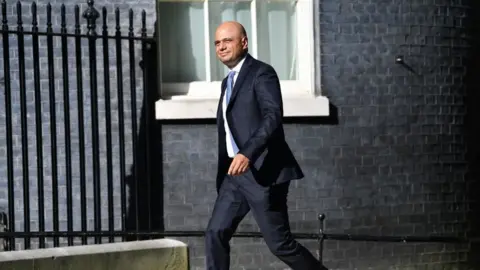Sajid Javid: What should we expect from new chancellor?
 Getty Images
Getty ImagesAs a teenager in the 1980s, Sajid Javid, the UK's new chancellor, was an ardent admirer of Prime Minister Margaret Thatcher, the country's first female premier. He even has a portrait of the "Iron Lady" in his office.
So as he packs his things at the Home Office ready for the move to Treasury, that may be one of the things he takes with him, along with the sense that, like her, he is breaking new ground.
He was the first home secretary from an ethnic minority when he took the post last year. Now he will be the UK's first chancellor from the immigrant community.
He grew up being taunted with racist names, and hearing his parents' stories of how they arrived here with a pound in their pocket and a determination to work hard.
He's told the stories many times, although it is not yet clear how - or whether - those experiences will translate into policies, once he has his feet under the desk at Number 11 Downing Street.
The Confederation of British Industry (CBI), representing UK employers, has already sent round a long wish-list for the new administration, including calls to make it easier for firms to recruit workers from overseas.
Mr Javid has talked of creating a £100bn national infrastructure fund and investing heavily in house building, but the CBI would also like confirmation that big public infrastructure projects such as HS2 will go ahead.
The Trades Union Congress (TUC) would like to see the new chancellor focus on increasing real wages and investment in public services, the relaxation of austerity that has been trailed by Mr Javid's predecessor, Philip Hammond.
But before breaking the mould politically, Mr Javid was already confounding expectations for a state school boy from one of the least affluent parts of Bristol, by rapidly climbing the ranks in international banking.
He worked first for Chase Manhattan Bank and then Deutsche Bank, where by the age of 40, he was a senior managing director in charge of global credit trading, where according to the Financial Times he earned £3m a year.
So Miles Celic, chief executive at CityUK, the body representing the financial services industry, hopes that Mr Javid's knowledge and experience of the sector will make him see things from their perspective.
"He's someone who knows the industry, he's worked in the industry, but most importantly he was city minister previously," says Mr Celic. "He's familiar with our issues, our challenges."

Who is Sajid Javid?
Born in Rochdale, Lancashire
49-year-old son of immigrant parents from Pakistan
Attended state comprehensive in Bristol
Studied politics and economics at Exeter University, where he joined the Conservatives
Home secretary in Theresa May's government 2018-2019
A Eurosceptic who backed Remain in the referendum with a "heavy heart and no enthusiasm"

What the City would like most of all, of course, is certainty and continuity in the UK's relationship with the EU. That may be hard for Mr Javid to deliver, his room for manoeuvre determined by the new occupant next door at Number 10.
Mr Celic believes Mr Javid will want to build on the plans his predecessor Philip Hammond put in place, trying to negotiate a deal with the EU. But the new chancellor has previously said he would be prepared to take Britain out of the EU without a deal if necessary. He has spoken of preparing an "emergency Budget" including tax cuts to smooth the way.
Tax cuts won't be popular with everyone.
"In the leadership election, we heard a lot about increasing funding for public services and making sure public servants get a pay rise. It's something we hope they'd be taking seriously," says Kate Bell, head of economics at the TUC. "We heard other - worrying - things about tax cuts for higher earners which shouldn't be the priority at this stage."
During that election race, Mr Javid said his priority would be to cut the basic rate, but he told the Telegraph he would consider scrapping the top rate of income tax altogether, if he thought it would inject more "dynamism" into the economy.
